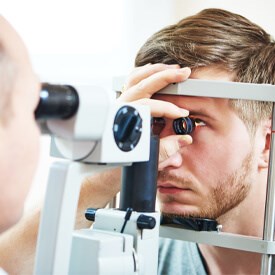Diabetic Retinopathy in Lake Worth, FL
What Is Diabetic Retinopathy?
Diabetic retinopathy is a serious eye condition that can permanently damage important structures in the eye, like the blood vessels and retina. Caused by uncontrolled and elevated blood sugar levels, diabetes-related complications can make the blood vessels in your eyes expand, leak, or become clogged. These issues inhibit blood from properly flowing and providing essential nutrients to your eyes. If the symptoms start to occur, you have an increased risk of experiencing serious eye problems, such as retinal detachment, glaucoma, macular edema, and partial or total vision loss. Because you do not experience diabetic retinopathy symptoms until the more advanced stages of this condition, we highly recommend scheduling annual visits to avoid any long-term damage. Palm Beach Eye Center offers treatment for diabetic retinopathy in Lake Worth, FL and Delray Beach, FL. Please schedule a consultation if you have diabetes so we can help you monitor your eye health or talk about treatments for diabetic retinopathy.
What are the symptoms of Diabetic Retinopathy?
It’s important to understand the symptoms of diabetic retinopathy so you can receive the proper treatment. A few of the common signs of diabetic retinopathy may include the following:
- Eye floaters (spots in your vision)
- Your visual field is narrow
- You have dark areas in your field of visions
- Eye flashes (periodic flashes of light)
- Color blindness
- Blurry vision
If you’re experiencing any of the listed symptoms or have any concerns, contact our Palm Beach Eye Center office. We’ll schedule an appointment to have your eyes checked.
What Are The Causes Of Diabetic Retinopathy?
Diabetic retinopathy is caused by prolonged elevated blood sugar levels, which damage the tiny blood vessels in the retina. When blood sugar levels remain uncontrolled, these vessels can swell, leak, or become blocked, preventing the retina from receiving essential nutrients. This disruption in blood flow leads to various complications, such as the formation of abnormal blood vessels. Over time, these changes can result in severe eye issues, including retinal detachment, glaucoma, macular edema, and potentially total vision loss if left untreated.
What Are The Risk Factors For Diabetic Retinopathy?
Several factors can increase the likelihood of developing diabetic retinopathy, including:
- Duration of diabetes: The longer you have diabetes, the greater the risk of developing eye complications.
- Poor blood sugar control: Consistently high blood sugar levels can accelerate damage to the retinal blood vessels.
- High blood pressure: Hypertension can worsen the effects of diabetic retinopathy by putting additional strain on the blood vessels.
- High cholesterol levels: Elevated cholesterol can contribute to blockages and damage in the small blood vessels of the retina.
- Tobacco use: Smoking damages blood vessels throughout the body, including those in the eyes, increasing the risk of complications.
How Is Diabetic Retinopathy Diagnosed?
If you have diabetes, regular visits to your ophthalmologist to undergo comprehensive eye exams are vital to detecting and diagnosing diabetic retinopathy. Our expert ophthalmologists in Lake Worth, FL, may perform tests and examinations to determine if an individual is showing signs of diabetic retinopathy by checking:
- Visual acuity
- Eye muscle function
- Pupil response
- Peripheral vision
- Intraocular pressure
After assessing everything listed above, your ophthalmologist may also put drops in your eyes to dilate your pupils. By doing this, they will be able to check for symptoms like abnormal blood vessels, bleeding in the center or the eye, and retina swelling. If an individual can receive a diabetic retinopathy diagnosis early, they have a better chance of preventing permanent damage to the eye.
How Is Diabetic Retinopathy Treated?
Patients can experience two different stages of diabetic retinopathy. These include non-proliferative diabetic retinopathy (early stage) and proliferative diabetic retinopathy (advanced stage).
Our first step is to complete a thorough eye exam, diagnose your condition, and develop a treatment plan. Unfortunately, diabetic retinopathy is not curable, but we offer solutions to decrease symptoms and prevent it from worsening. Depending on your exact needs, our group may suggestvitrectomy, laser options, or anti-VEGF(vascular endothelial growth factor) medications. In addition to following your eye care plan, patients should try their best to control diabetes with a healthy weight, nourishing diet, and proper blood sugar levels.
Diabetic Retinopathy FAQ
Is diabetic retinopathy curable?
There is no cure for diabetic retinopathy currently, but the damage is preventable and treatable, so regular visits to your ophthalmologist are vital in preserving your vision. For treatment for diabetic retinopathy in Lake Worth, FL, contact Palm Beach Eye Center.
Can diabetic retinopathy cause total vision loss?
Diabetic retinopathy can cause complete vision loss. However, blindness typically occurs after several years of diabetic retinopathy or if the condition is undiagnosed or untreated. The sooner you are diagnosed and treated, the less likely you will go blind from diabetic retinopathy.
What are the complications of diabetic retinopathy?
There are several vision-threatening complications of diabetic retinopathy. The best treatment for diabetic retinopathy in Lake Worth, FL, is early detection and intervention. If left untreated, diabetic retinopathy can lead to these serious complications:
- Retinal detachment
- Vitreous hemorrhage
- Glaucoma
- Diabetic macular edema
Can diabetic retinopathy be reversed?
Diabetic retinopathy cannot be fully reversed, but its progression can be halted or significantly slowed with early diagnosis and appropriate treatment. Effective management of diabetes and timely interventions, such as laser therapy or injections, can help preserve vision and prevent further damage to the retina.
How quickly does diabetic retinopathy develop?
Diabetic retinopathy can develop gradually, often taking several years to progress from mild symptoms to more severe forms of the disease. However, in some cases, rapid progression can occur, particularly if blood sugar levels remain poorly controlled.
What are the different types of diabetic retinopathy?
There are two main types of diabetic retinopathy: nonproliferative diabetic retinopathy (NPDR) and proliferative diabetic retinopathy (PDR). NPDR is characterized by mild to moderate changes in the retina, while PDR involves the growth of new blood vessels, which can lead to more severe vision problems.
Prevent Diabetic Retinopathy
Scheduling a routine eye exam is critical for individuals with diabetes. We have a better chance of preventing permanent damage and reducing vision loss if treated earlier on. If you have diabetes, we encourage you to schedule an eye exam at Palm Beach Eye Center to protect your eyesight. Our dedicated team of Lake Worth, FL ophthalmologists can help manage your eye health and provide the best course of action for your needs.
*Individual results are not guaranteed and may vary from person to person. Images may contain models.



